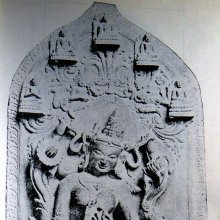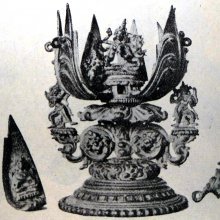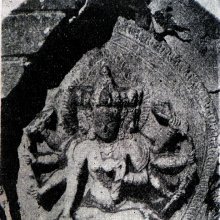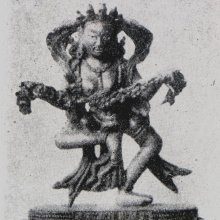Tare: 3 definitions
Introduction:
Tare means something in biology. If you want to know the exact meaning, history, etymology or English translation of this term then check out the descriptions on this page. Add your comment or reference to a book if you want to contribute to this summary article.
Images (photo gallery)
(+1 more images available)
Biology (plants and animals)
Source: Wisdom Library: Local Names of Plants and DrugsTare [ತಾರೆ, ತಾಱೆ] in the Kannada language is the name of a plant identified with Terminalia bellirica (Gaertn.) Roxb. from the Combretaceae (Rangoon creeper) family having the following synonyms: Myrobalanus bellirica. For the possible medicinal usage of tare, you can check this page for potential sources and references, although be aware that any some or none of the side-effects may not be mentioned here, wether they be harmful or beneficial to health.
Source: Google Books: CRC World Dictionary (Regional names)1) Tare in English is the name of a plant defined with Vicia sativa in various botanical sources. This page contains potential references in Ayurveda, modern medicine, and other folk traditions or local practices It has the synonym Vicia morisiana Jordan ex Boreau (among others).
2) Tare in India is also identified with Acacia catechu It has the synonym Acacia catechu (L.f.) Willd. var. catechuoides (Roxb.) Prain (etc.).
3) Tare is also identified with Calamus erectus It has the synonym Palmijuncus macrocarpus (Griff. ex Mart.) Kuntze (etc.).
4) Tare is also identified with Cocos nucifera It has the synonym Cocos indica Royle (etc.).
Example references for further research on medicinal uses or toxicity (see latin names for full list):
· London Journal of Botany (1842)
· Species Plantarum.
· Flora of Taiwan (1993)
· Flora Libycae Specimen (1824)
· Supplementum Plantarum (1782)
· Iranian Journal of Botany (1985)
If you are looking for specific details regarding Tare, for example side effects, diet and recipes, extract dosage, health benefits, pregnancy safety, chemical composition, have a look at these references.

This sections includes definitions from the five kingdoms of living things: Animals, Plants, Fungi, Protists and Monera. It will include both the official binomial nomenclature (scientific names usually in Latin) as well as regional spellings and variants.
Languages of India and abroad
Kannada-English dictionary
Source: Alar: Kannada-English corpusTare (ತರೆ):—
1) [verb] to separate (a part) from the whole by or as by cutting; to cut; to sever.
2) [verb] to pull, tear off or pluck out.
3) [verb] to damage, injure or mar; to destroy.
4) [verb] to inflict superficial wound; to scratch.
5) [verb] (the head) to lose hair; to become bald.
6) [verb] to beat; to deliver blow or blows; to strike with.
7) [verb] to exempt from an obligation of paying (a tax).
--- OR ---
Tare (ತರೆ):—[noun] the tree Acacia catechu (= Mimosa catechu) of Mimosae family; black catechu.
--- OR ---
Taṟe (ತಱೆ):—[verb] = ತಱಿ [tari]1.
--- OR ---
Tāre (ತಾರೆ):—[noun] the large deciduous tree Terminalia belerica (= T. bellirica, = T. bellerica) of Combretaceae family.
--- OR ---
Tāre (ತಾರೆ):—
1) [noun] any of the heavenly bodies, except planets and satellites, appearing as fixed luminous points in the sky at night; a star.
2) [noun] the expanding and contracting opening in the iris of the eye, through which light passes to the retina; the pupil of the eye.
3) [noun] a smooth, rounded bead formed within the shells of certain molluscs and composed of the mineral aragonite or calcite in a matrix, deposited in concentric layers as a protective coating around an irritating foreign object, valued as a gem when lustrous and finely coloured; a pearl.
4) [noun] a necklace sewn with a pearl or pearls.
5) [noun] (myth.) name of the wife of Břhaspati, the preceptor of gods.
6) [noun] the air or wind.
7) [noun] a person who is celebrated or distinguished in the cinema or theatre; a star.
8) [noun] silver.
--- OR ---
Tāṟe (ತಾಱೆ):—[noun] the large deciduous tree Terminalia belerica (= T. bellirica, = T. bellerica) of Combretaceae family.
Kannada is a Dravidian language (as opposed to the Indo-European language family) mainly spoken in the southwestern region of India.
See also (Relevant definitions)
Starts with (+16): Jarenere, Tare mendo, Tare-bhira, Tarebak, Tareci Bangadi, Tareda, Tarekai sippe, Tarekamgali, Tarekayi, Tarekha, Tarele, Tareli, Tarem, Taremama, Taremvarem, Tarendra, Tarenna alpestris, Tarenna asiatica, Tarenna odorata, Tarenna sambucina.
Ends with (+50): Acalatare, Agnitare, Akshitare, Ankh-tare, Antare, Anuttare, Atare, Atrantare, Battare, Budatare, Dhruvatare, Duratare, Ekatare, Gotare, Hairy tare, Hottare, Huttare, Itare, Janmatare, Kamakatare.
Full-text (+23): Yellow tare, Hairy tare, Tare mendo, Tareya, Sayatare, Avadhyana, Duratare, Asali, Niravastara, Dridhapraharanataraka, Asli, Ankh-tare, Khadga, Purvahnakale, Anyataranyatara, Abhidhana, Tara, Tras, Dhada, Ashtamahabhaya.
Relevant text
Search found 31 books and stories containing Tare, Taṟe, Tāre, Tāṟe; (plurals include: Tares, Taṟes, Tāres, Tāṟes). You can also click to the full overview containing English textual excerpts. Below are direct links for the most relevant articles:
Tattvartha Sutra (with commentary) (by Vijay K. Jain)
Verse 4.12 - The subclasses of the stellar beings (jyotiṣka-deva) < [Chapter 4 - The Celestial Beings]
Chaitanya Bhagavata (by Bhumipati Dāsa)
Verse 3.5.371 < [Chapter 5 - The Pastimes of Nityānanda]
Verse 2.28.80 < [Chapter 28 - The Lord’s Pastime of Accepting Sannyāsa]
Verse 3.2.354 < [Chapter 2 - Description of the Lord’s Travel Through Bhuvaneśvara and Other Placesto Jagannātha Purī]
Rig Veda (translation and commentary) (by H. H. Wilson)
Sripura (Archaeological Survey) (by Bikash Chandra Pradhan)
Scultures of Buddhist Goddesses (3): Vajratara < [Chapter 3 - Sculptural Programme]





